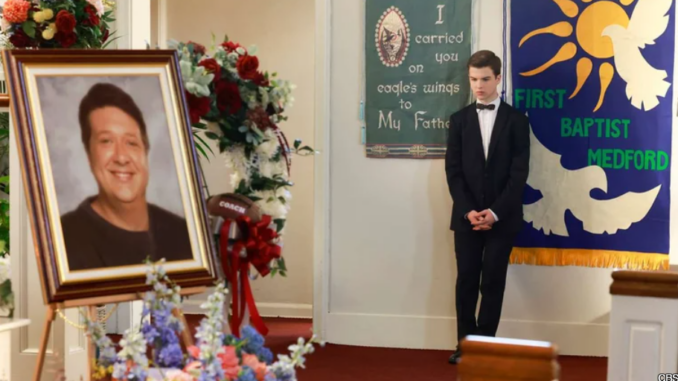
Introduction: A Decision That Echoed Across Two Shows
When Chuck Lorre and his team crafted The Big Bang Theory, they likely didn’t anticipate how one small backstory detail would ripple into an emotional quandary years later. George Cooper Sr., Sheldon’s father, was destined to meet a tragic fate—a detail established casually in The Big Bang Theory. But as Young Sheldon grew into its own, showcasing George Sr. as a multidimensional, lovable character, this decision became a bittersweet legacy for Lorre and fans alike.
The Origins of George Sr.’s Death
Establishing Sheldon’s Backstory in The Big Bang Theory
In The Big Bang Theory, George Sr. was referenced sparingly. Sheldon painted his father as a flawed man—one prone to drinking, infidelity, and poor parenting. This characterization set the stage for a pivotal plotline: the emotional disruption caused by George Sr.’s untimely death during Sheldon’s youth.
The Casual Mention That Sealed George Sr.’s Fate
A fleeting moment in The Big Bang Theory mentioned George’s cause of death, cryptically labeled as “S.B.L.” While largely overlooked at the time, this decision would later become a cornerstone—and a challenge—for Young Sheldon.
Young Sheldon Humanizes George Sr.
A Retcon That Reshaped Perceptions
Unlike the caricature described by adult Sheldon, Young Sheldon portrayed George Sr. as a kind, hard-working, and often misunderstood father. Lance Barber’s nuanced performance brought warmth to the character, making him an integral part of the Cooper family dynamic.
A Flawed Yet Lovable Dad
Sure, George Sr. wasn’t perfect. He struggled to connect with his genius son, but his efforts were sincere. He was more than the man Sheldon described—he was a father trying his best under challenging circumstances.
Chuck Lorre’s Reflection on George Sr.’s Death
A Regret That Came Too Late
In a heartfelt vanity card following George Sr.’s death on Young Sheldon, Chuck Lorre admitted his regret. He acknowledged that the decision, made nearly two decades prior, felt flippant in hindsight.
“We Fell in Love with a Fictional Character”
Lorre’s emotional response highlighted how much George Sr. had evolved. The tears shed by the cast and crew during the final scene were a testament to the character’s impact—not just on the show, but on everyone involved.
Balancing Continuity and Creativity
Navigating Contradictions Between the Shows
The contrast between George Sr.’s portrayal in The Big Bang Theory and Young Sheldon posed a challenge. How could the lovable dad in one show align with the flawed man described in the other?
A Necessary Retcon for a Standalone Story
Co-showrunner Steve Holland explained that Young Sheldon needed room to grow. Forcing George Sr. into the mold of his Big Bang Theory characterization would have stifled the spinoff’s emotional depth and narrative freedom.
The Emotional Impact of George Sr.’s Death
A Heartbreaking Goodbye
George Sr.’s death in Young Sheldon was an inevitable yet devastating moment. The episode, titled “A New Home and a Traditional Texas Torture,” showed the Cooper family grappling with loss in a way that resonated deeply with fans.
A Legacy of Love and Loss
This tragic event added gravity to Young Sheldon, setting it apart from traditional sitcoms. It reminded viewers of life’s fragility and the importance of cherishing loved ones.
Fans React to George Sr.’s Death
An Outpouring of Emotion
Fans flooded social media with reactions, sharing their heartbreak over George Sr.’s passing and praising Lance Barber’s performance.
Nostalgia Meets New Perspectives
Many viewers found themselves reevaluating Sheldon’s harsh memories from The Big Bang Theory, realizing that grief and time had likely colored his perceptions.
How George Sr.’s Death Defined Young Sheldon
A Bold Narrative Choice
By addressing George Sr.’s death head-on, Young Sheldon took a daring step that added depth and authenticity to its storytelling.
A Standout Final Season
The final episodes of Young Sheldon are widely regarded as some of the most impactful in recent sitcom history, cementing the show’s legacy.
Conclusion: A Bittersweet Legacy
George Sr.’s death may have started as a throwaway detail, but it evolved into one of the most poignant aspects of Young Sheldon. While Chuck Lorre regrets the decision, it’s clear that this narrative choice gave both shows emotional resonance and depth.
FAQs
1. Why did Chuck Lorre regret killing George Sr.?
Lorre regretted the decision because George Sr. became a beloved character in Young Sheldon, making his death far more impactful than initially intended.
2. How did fans react to George Sr.’s death?
Fans expressed heartbreak and admiration for the show’s emotional storytelling, with many praising Lance Barber’s performance.
3. Was George Sr. portrayed differently in The Big Bang Theory and Young Sheldon?
Yes, he was depicted as flawed and neglectful in The Big Bang Theory but as a kind and loving father in Young Sheldon.
4. How did Young Sheldon address the discrepancy between the two portrayals?
The showrunners explained that they needed to let Young Sheldon grow as its own series, allowing George Sr. to evolve into a more complex character.
5. What made George Sr.’s death so significant in Young Sheldon?
It added emotional weight and set the show apart from other sitcoms, providing a powerful conclusion to the series.